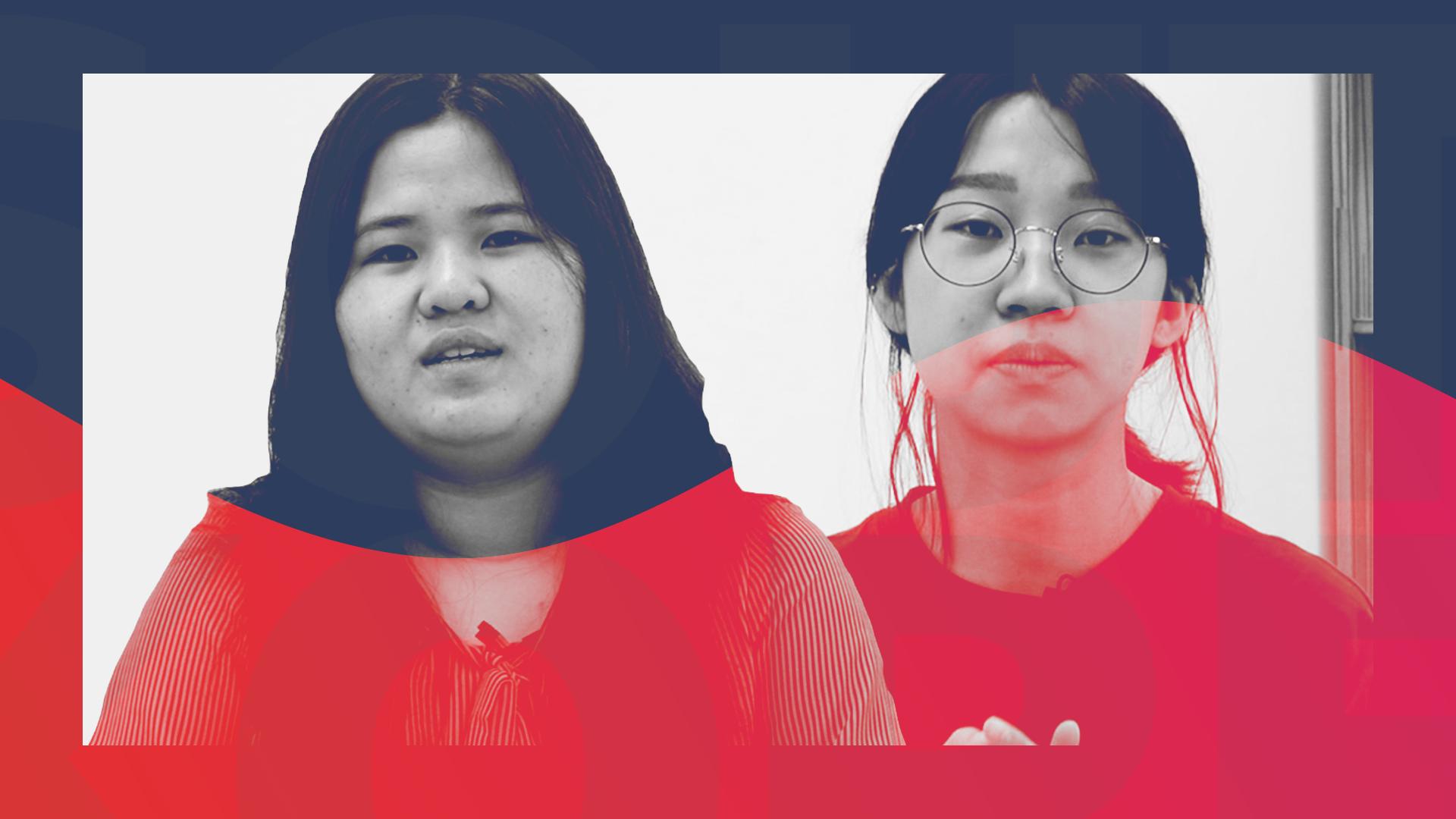Han Sung-ok: Was this North Korean defector failed by the South?
- Published
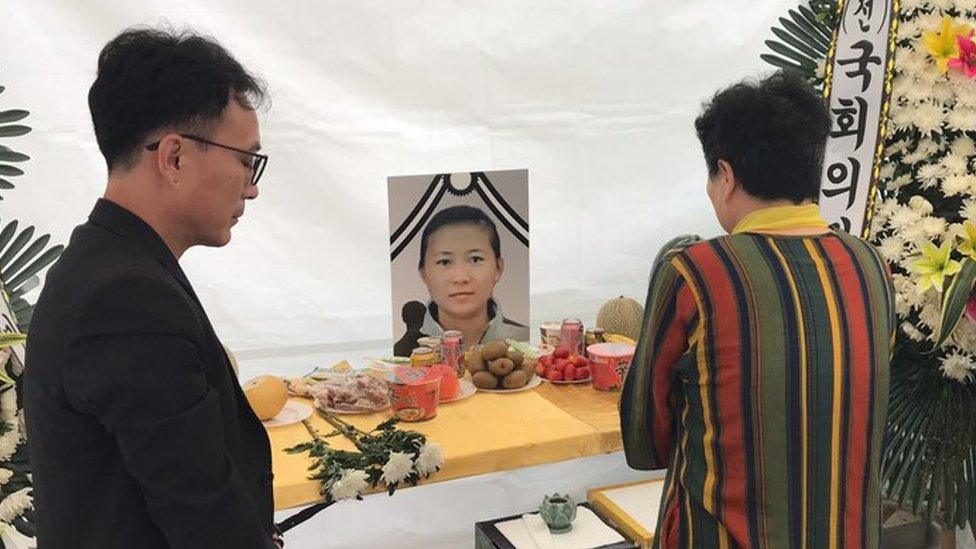
Han Sung-ok has the recognition in death she never received in life
Han Sung-ok, 42, seemed determined to pick through nearly every lettuce on the market stand. She turned each one over and examined it while her six-year-old son clambered on the fence nearby.
The vegetable seller in the southern Seoul suburb looked on, annoyed. This was one picky customer and she didn't even buy a lot of vegetables - only one or two items for as little as she could pay. On this occasion it was a lettuce for 500 won (about $0.40; £0.33).
Uttering only a few words, Han handed over her money and left with her son.
Just a few weeks later, both were dead.
Having fled food shortages in her native North Korea and dreaming of a new life, Han and her son are believed to have starved to death in one of the wealthiest cities in Asia. Their bodies lay undiscovered for two months until someone came to read the water meter and noticed a bad smell.
Mother and son were found apart on the floor. The only food in their tiny rented apartment was a bag of red pepper chilli flakes.
'If only she'd asked...'
One of the last people to see her alive was the vegetable vendor in the street outside her apartment complex. She saw her in spring - around the same time the police say Han withdrew the last 3,858 won ($3.20; £2.60) in her bank account.
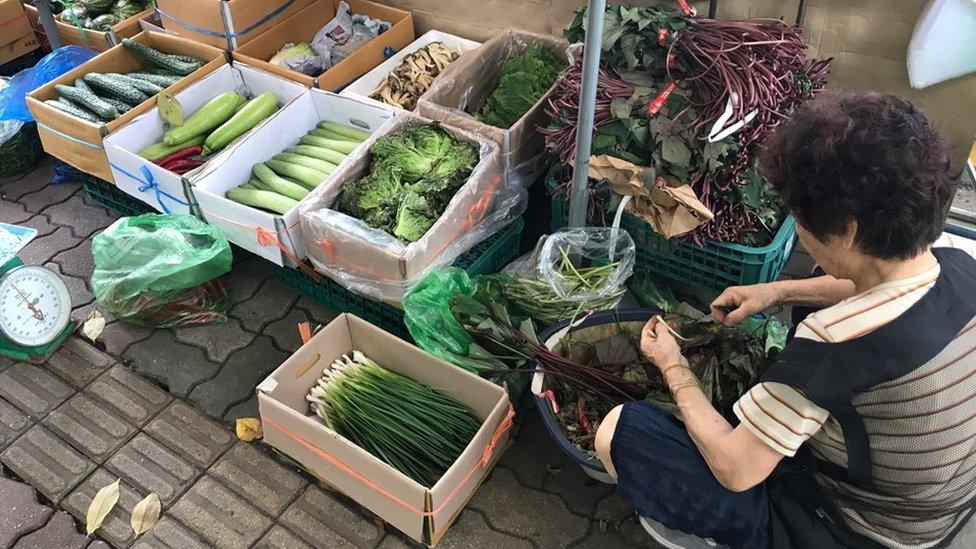
"Thinking back, it gives me shivers," she said. "At first I hated her for being picky, but now I think about it, I am sorry for her.
"If only she'd asked nicely, I would have just given her some lettuce."
She's one of many we spoke to who are asking questions which begin with the phrase "If only". If only the authorities had noticed her plight. If only the government had done more to help defectors. If only she'd asked for help.
Their horrific deaths have prompted outrage and anger and a great deal of soul searching.
Han's journey to freedom as a North Korean defector should have made her remarkable, but in this city of 10 million people, she appears to have been invisible. Very few people knew her. Those who did, say she spoke very little and would walk around almost disguising herself with a hat and avoiding all eye contact.
But this city knows her now.
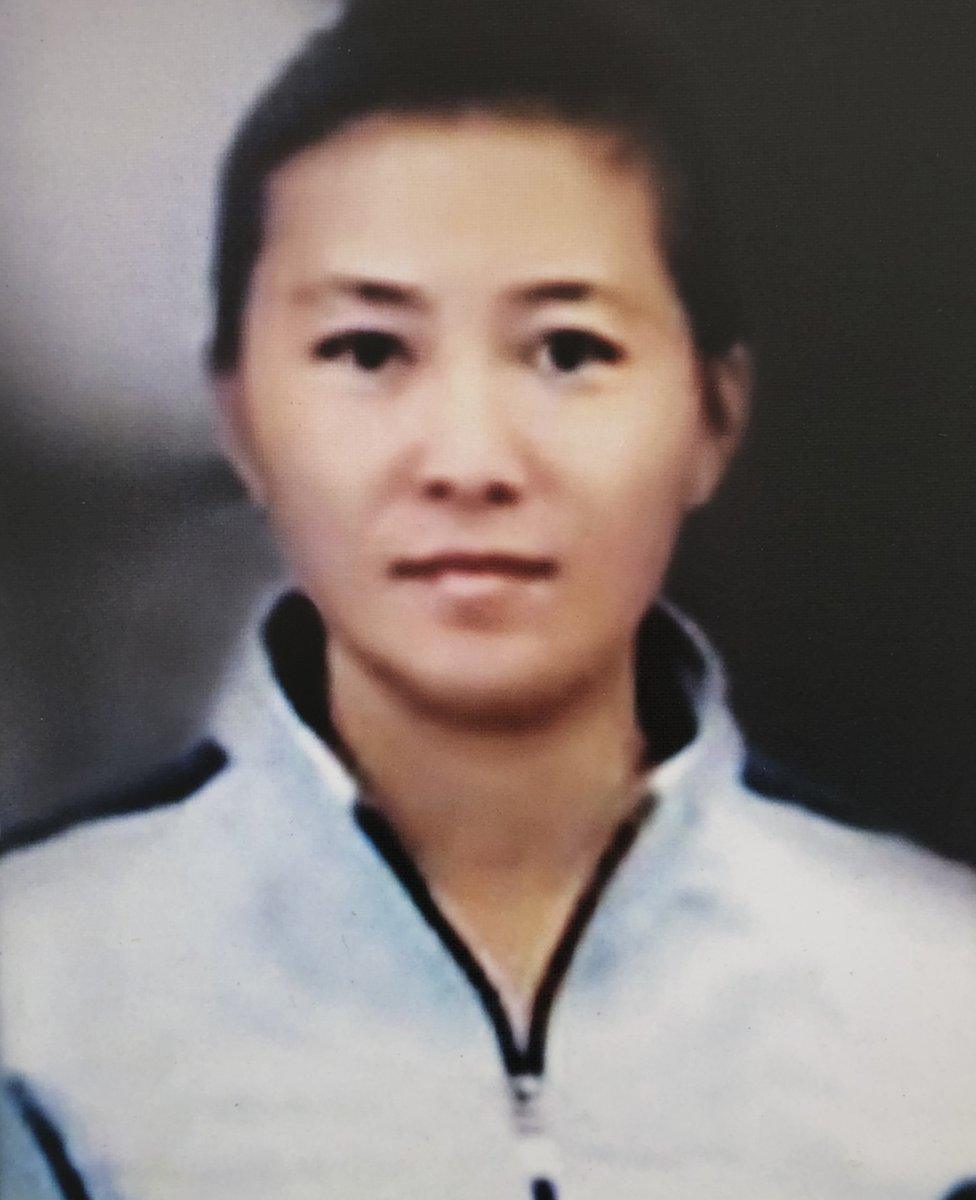

Her photograph has been placed among flowers and gifts in a makeshift shrine in Gwanghwamun in the centre of Seoul. Dozens of mourners are shouting her name through loudspeakers, though few there knew her personally.
"It just doesn't make sense that after going through all that hardship and challenges to come to South and she dies of starvation. It breaks my heart," one defector mourning at the shrine told us. "When I first heard the news, it was too absurd to believe.
"This cannot happen in South Korea. Why did nobody know about this until they died?"
But one of the reasons no-one knew is because Han appears to have wanted to stay hidden.
A laugh with a dark side
Escaping North Korea can feel almost impossible. More people have attempted to scale Mount Everest this year than leave the impoverished state. Even if you get past the soldiers and surveillance at the border, defectors face a journey of thousands of miles through China. Their aim is to get to a South Korean embassy in a third country. Usually in Thailand, Cambodia or Vietnam.
But getting through China is a huge risk. If caught, they're sent back to North Korea and could face a lifetime of hard labour in one of its notorious gulags. Female defectors who hand money to disreputable brokers hoping for help often find themselves imprisoned and sold as brides or sex workers.
In Han's case, it is difficult to verify how and when she left North Korea. Two defectors who claim to have spoken to her believe she was sold to a Chinese man as a bride and had a son with him. We cannot verify this account.
But she arrived in Seoul alone, 10 years ago, and certainly didn't open up to many of her classmates at the Hanawon centre.
All defectors face a mandatory 12-week basic education at such a centre, affiliated with Seoul's Unification Ministry, to adjust to life in the South. Han's class was one of the largest since the centre had been set up. It had more than 300 people in it. They all knew how hard it was to get through China.
"I knew she went to China first. I knew because even when she laughed and was bright, there was a dark side," one of her classmates told us.
"I asked her what was wrong but she brushed me off.
"I'm the type of person not to push too much on personal matters, so I said, 'I don't know what it is, but if you go outside, as long as you work hard you can live a good life. South Korea is a place that you get what you work for. You're young and beautiful, you won't have a hard life. Whatever you do don't be ashamed and live with your head up'."
Han appeared to do well in her new life at first. The authorities help defectors find subsidised apartments, and she along with six of her classmates were settled in the same neighbourhood, Gwanak-gu.
"She was so pretty and feminine," her classmate said. "I believe she was the second person after me in our class to get a job. At first, she worked briefly at a coffee shop in Seoul University. Even there, I heard she made a good impression. What we remember is that she was smart, feminine and we thought she was someone who would be able to take care of herself.
"We didn't expect this to happen."
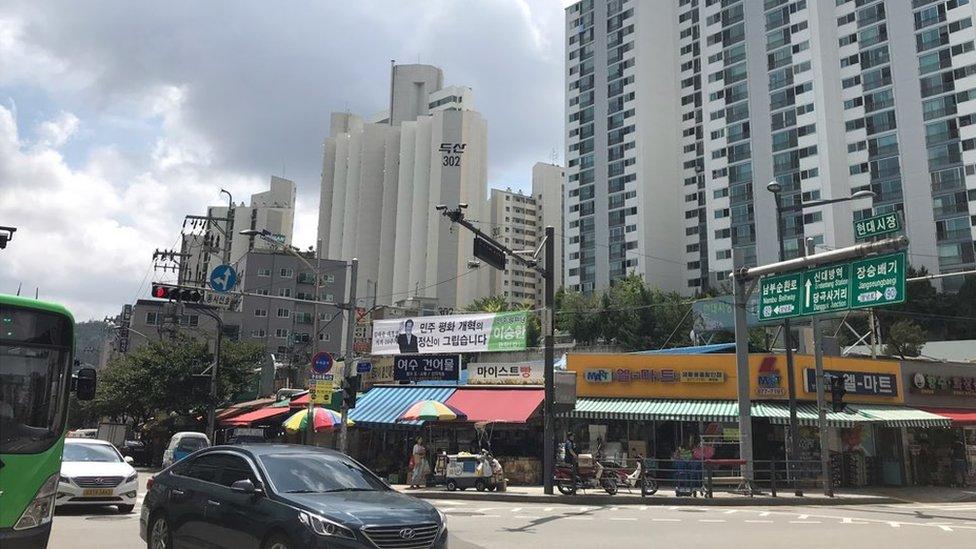
Like all defectors Han had help finding a new place to live in Seoul
It is difficult to find out how, from this promising start, Han ended up destitute. She was so private.
Two defectors in her apartment complex told us they believe she had persuaded her Chinese husband to move to South Korea. As a family, they relocated south to Tongyeong where he worked at a shipyard. She had a second son who was born with learning difficulties.
Eventually it is thought her husband went back to China without her, taking the eldest son with him. She was left alone with no job and caring for a disabled child.
Her neighbours say she missed her older son terribly.
She moved back to where her South Korean life had started - the subsidised housing apartments in Gwanak-gu in Seoul. She applied for help at the community centre in October last year and received 100,000 won ($94) each month in child allowance.
It is at this time that Han and her son appear to have fallen through a gap in the welfare system.
She could have claimed much more than the universal child benefit. A single parent is entitled to six to seven times that amount each month. But that would have required a divorce certificate and it is our understanding that she didn't have one.
The community centre staff said they visited her apartment for their annual welfare check in April but she wasn't home. They were not aware of her son's condition. She hadn't paid the rent of her subsidised apartment or her bills for some time. In some other countries this would have raised a red flag to social services. It doesn't appear to have happened in South Korea.
She was also no longer eligible for help as a North Korean defector because the protection period of five years had expired.
'This is a death by indifference'
When they gathered at the shrine in Gwanghwamun, in front of Han's smiling portrait, the debate among the defector community continued.
"This is absurd, how ironic a North Korean escapes hunger and comes to South to die of starvation!"
"What did the South Korean government do? This is death by abandonment."
"This is a death by indifference."
"Where is the system, where is the police?"
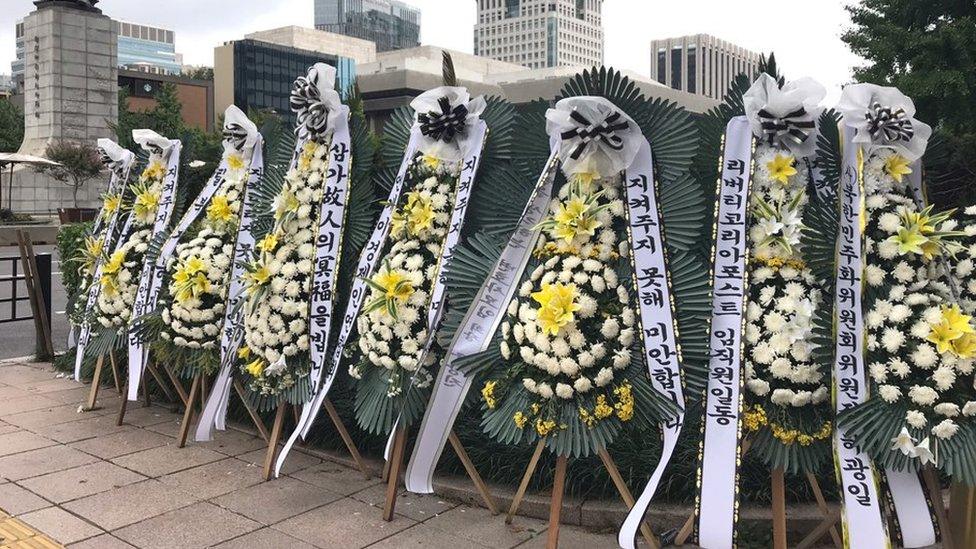
Tributes are left to Han and her son from people who never knew them
However her former classmate said this is not how she wants her friend to be remembered.
"I don't want to cause a row, pointing fingers at whose fault this is. We should just come together as one and vow to never let this happen again. It really hurts my heart how things are turning out, how people are taking advantage of this for their purpose."
So what lessons can be learned?
The last reports we received about Han from a neighbour claim she was distracted and anxious. A far cry from the bright woman who arrived at the Hanawon centre 10 years ago.
At no point did Han ask for help. But should help have come to her?
Mental health care for North Korean refugees is one area that could be improved, according to defectors and psychiatrists. Most defectors have suffered a number of human rights violations and trauma ranging from extreme hunger, sexual assault, being forced to witness public executions and the fear of human traffickers in China.
The rate of psychological trauma is higher among those who have travelled through China, according to a study by the National Human Rights Commission of Korea.
Four defectors talk about what life is like in North Korea
Dr Jun Jin-yong from the National Centre for Mental Health said it is common for defectors to suffer anxiety, depression and post-traumatic stress disorder. But because there are so many stigmas associated with mental health in the North, many aren't aware that they're suffering or that help is available.
Anyone suffering mental illness in North Korea is sent to a hospital in the mountains called Number 49. Most never return. It is perhaps understandable that North Koreans are unaware that psychiatric help is available.
"We need services that are more defector-friendly and to guide defectors to find these services," Dr Jun said.
"Defectors have a lower approachability than South Koreans on mental health issues because they have a prejudice against mental health. So we should continue to advertise mental health support to defectors so that they can receive help."
According to a settlement survey of North Korean refugees in South Korea, about 15% admit to having suicidal thoughts. That's about 10% higher than the South Korean average. Most say economic hardship is the main reason they feel unable to cope.

Joseph Park built a new life in Seoul, but many defectors struggle to make their way
There is also more of a sense of community in North Korea. We've been told that, north of the border, Han and her son would not have been allowed to shut themselves away in their apartment.
Joseph Park who also escaped from North Korea 15 years ago, decided to run coffee shops in Seoul to cultivate a community for defectors. He believes the shocking deaths of Han and her son were not caused by a lack of government policy, but can be partly blamed on certain aspects of South Korean culture.
"South Korea is a society where you can live without relationships. In North Korea you need relationships to survive," he told us.
"I think that's the big difference. In South Korea, you can survive without having a relationship with your neighbour. But in North Korea, you need relations with your neighbour and the system forces you to have relations as well.
"For example, in North Korean schools, if someone doesn't come to class, the teacher would send all the classmates to the missing student's house. So naturally, there can't be anyone left out. In North Korea it would be not possible for someone to be out of touch for a month like that."
Thousands of North Koreans live hugely successful and fulfilling lives in the South. But it does require them to change and to adapt to their neighbours' ways. Defectors have told numerous studies they are made to feel different, and face discrimination.
The results of a post-mortem on Han and her son are expected soon, but South Korea's Unification Ministry is already examining Han's case in the hope lessons can be learned.
What is clear is that those from North and South often still feel separate - even when they live in the same city.
Perhaps Han's story should give pause for thought for all in Seoul in the hope that this society will never again have to ask itself, if only.
- Published18 January 2019

- Published18 February 2019
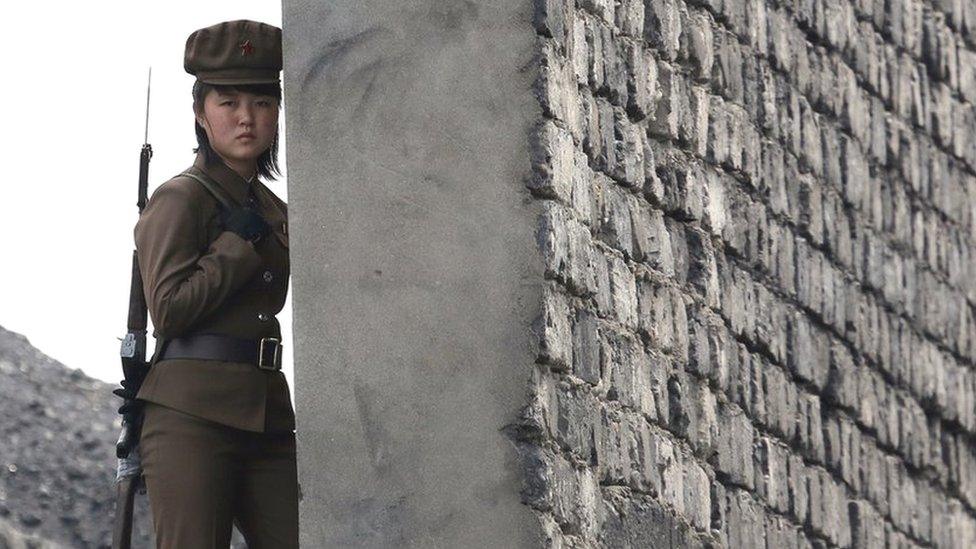
- Published2 January 2018
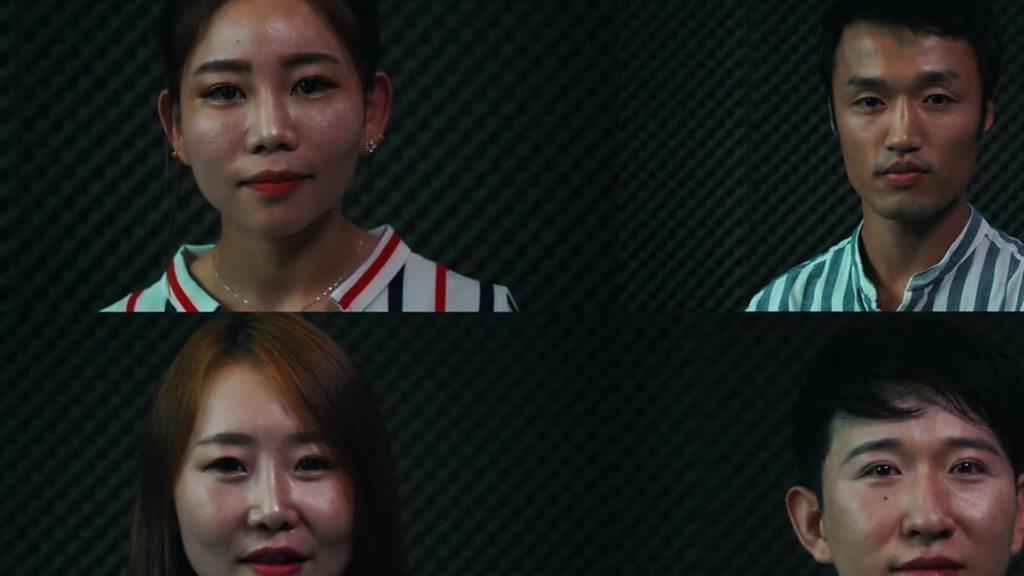
- Published22 February 2019
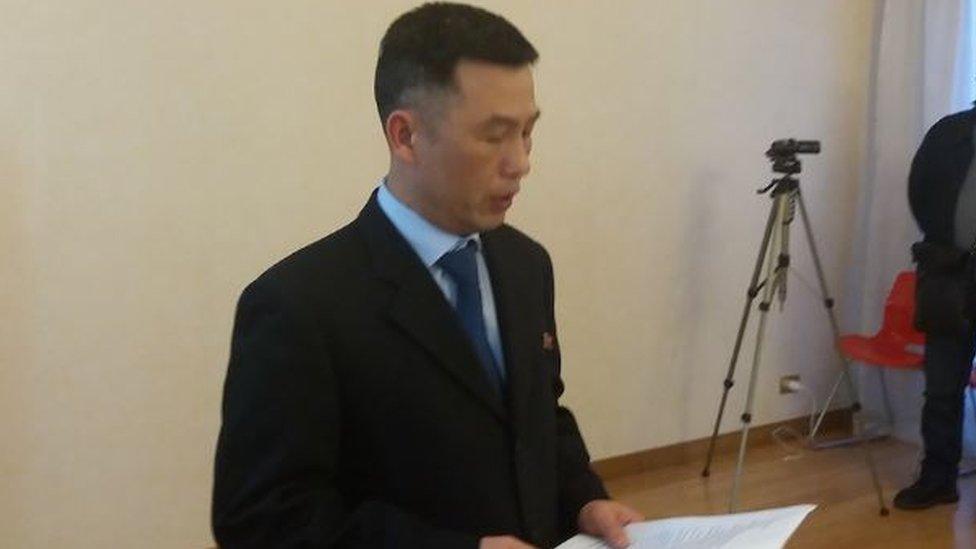
- Published9 July 2019
